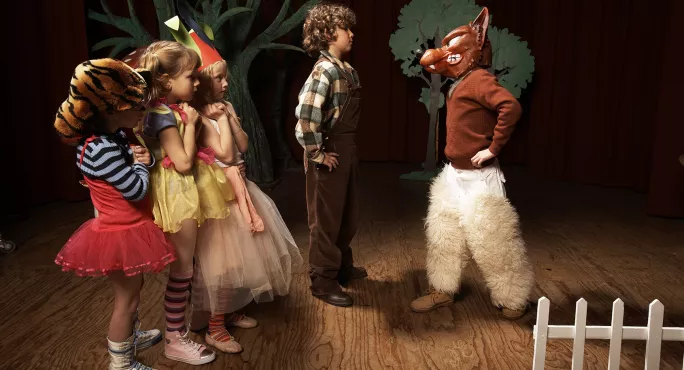Dust off the footlights and cue the music, it’s time for a school play!
It will be the all-singing, all-dancing, parent-pleasing, school community event of the year! Won’t it?
Not necessarily. You need to tread carefully to avoid the performance descending into a mess of complaints, crushed self-esteem and diva tantrums (and that’s just the headteacher).
Quick read: Many pupils ‘only experience the arts at school’
Quick listen: Learning through play: what are the benefits?
Want to know more? Teacher, tailor, YouTuber, spy
Here’s our survival guide:
1. Choose your play wisely
You know your students, so pick something that will be a good fit for the abilities on offer. Do you want to stretch them with something challenging or offer a gentler introduction to performance? Is there a part for everyone? Will it showcase the range of talent?
2. Assemble your crew
Don’t try to do it all alone. Ask for volunteers from the school community; you may be surprised at how many people want to help, as well as the expertise they can offer. Pool your skills and reap the benefits.
3. Cast wisely
Hold auditions for anyone who would like a speaking role and put your preconceptions to one side. Gifted performers should be given the opportunity to shine (after all, you wouldn’t leave pupils who were talented at PE out of the school sports teams), but give others a chance, too.
Children who are quiet in the classroom may be completely different on stage, and the class loudmouth may fall apart in front of an audience.
Pay attention to children who struggle academically and would benefit from taking part.
4. Big-up backstage roles
Some children hate being in the spotlight, and that’s fine. Provide lots of backstage roles (props, costume, lights, scene changes and so on) for pupils who are less keen on performing and ensure that they feel every bit as important as those on stage.
5. Teach stage skills
Nobody expects a professional performance,but you should still be teaching and developing drama skills. Work on voice projection, enunciation and stage presence. Spend time demonstrating how to be on stage without looking awkward when it’s not your turn to speak, and if there are songs, work on them until every note is perfect and they can raise the roof with their singing.
6. Rehearse productively
About four to six weeks of rehearsal should be enough for a primary school performance. Make the most of rehearsals by dividing the children into groups to work separately, minimising the amount of time that they are left sitting around doing nothing. Be sure to have a few full run-throughs, including one full technical and dress rehearsal.
7. Manage parents
Put on enough performances for everyone to be able to attend, rather than just one performance with limited tickets.
Try to manage the issue of small children in the audience, either by running a crèche during the performance or by making a kind but firm request that parents keep their younger children quiet and remove them from the hall if they become loud or unsettled.
It’s disheartening for pupils to work hard on a play only to have their lines obliterated by a crying baby or disruptive toddler.
8. Run a tight ship
Allocate backstage duty to your most bomb-proof staff members to ensure that everything stays quiet and calm, and give them a watertight schedule of who needs to be where and when.
Get everybody stage-ready with a vocal and physical warm-up and steel yourself for an hour or so of organised chaos.
9. Enjoy it
Keep a smile on your face no matter how stressful things get. If you look like you’re enjoying yourself, your pupils will, too. Break a leg!
Lisa Jarmin is an early years teacher and freelance journalist






